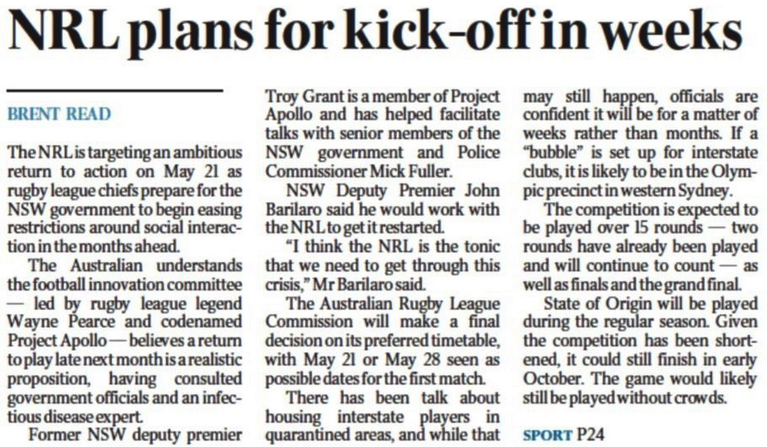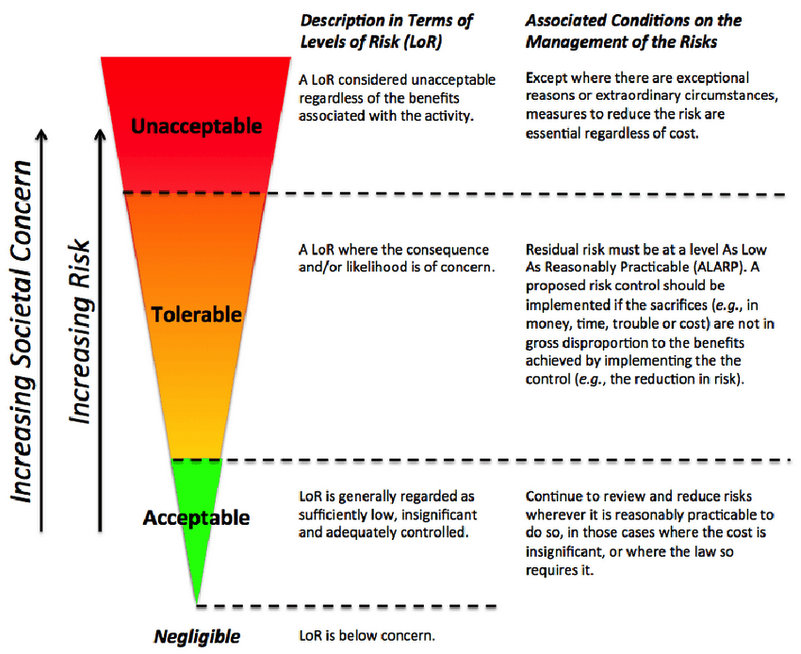Our major football codes are the canaries in the coal mine for hundreds of industries desperate to restart as soon as possible after the Government-enforced lockdown. If organisations with the size and influence of the Australian Football League and the National Rugby League cannot soon navigate a path back to profitable operations there is little hope for smaller businesses and their harried representatives in trade and industry associations.
For better or worse success will require an infusion of expertise from HSE, risk, compliance and process-minded managers – all the backrooms specialities called into being by a risk-averse society and bureaucratisation of corporate life.
Last week’s reveal of the NRL’s plans to restart rugby league by the end of May swiftly led to warnings from State and Federal Governments, but the bullish response by NRL Chairman Peter V’landys – claiming he already had the necessary permissions – suggests he does not understand the rules that now apply in a COVID19 world.

The Australian, April 9 2020
The problem facing Australia is that our ‘temporary’ restrictions have immediately become the new normal, and with public health officers driving the agenda the rule for decision makers is ‘no harm’.
As an experienced businessman, V’landys understands that no harm is not a rule for living, that we must and do accept some level of risk every day in order to work and to live. Like many Australians, he is also concerned about the risks of continuing in a state of indefinite lockdown, which for many sporting codes could well be terminal. He is also right that ‘You have to give people hope.”
The story is the same for hospitality, tourism, personal services, real estate and many other industries in Australia; but calls for certainty on when they can re-open are somewhat missing the point. The question better put is under what conditions they can reopen and in what sequence.
The AFL thought it had a more measured approach with talk of games recommencing in July, but the announcement by the Premier of Victoria, Daniel Andrews, that the State of Emergency would be extended into May (at the very least) appears to have thrown its plans into disarray.
The fierce Government reactions to news of the NRL’s plans show it can no longer rely on the social licence to operate that comes with being a game popular with the people, and reveals it now more resembles Australia’s harried mining industry.
The way forward is to quickly adapt and utilise the science and language of risk management to put forward a path back to full operations, and for Government to shoulder their rightful burden as the ultimate decision maker (rather than just being Dr No).
During Phase I of the coronavirus crisis – containment – the emphasis has been on macro models of risk management such as flattening the curve. While there is much discussion of Phase II at the macro level – including the much-vaunted “hammer and the dance” scenarios, there is insufficient attention to how this can work at the micro level – in individual workplaces and industries. In my view, Phase II must be all about the micro level decisions, and Governments should have their best people working on this rather than further analysing macro scenarios still requiring more robust data.
We see how micro level risk assessments are carried out in industries like mining, where the miners and the scientists and engineers who advise them have for a long time proceeded on the basis of reducing risk to As Low as Reasonably Practicable (ALARP).
If a miner said the risk of a tailings dam collapse was the equivalent of once every ten years their application to proceed would rightly be rejected. Instead, regulators look for plans where measures are taken to reduce this more like one in a thousand or ten thousand (but not never, which is an impossible benchmark). ALARP provides a language for technical operators and regulators to identify what is in the zone of a tolerable risk, once risks have been educated to ALARP.

Similarly, technical leaders across many industries put together a ‘safety case’ for their factories, chemical plants and off-shore oil rigs (for example). They demonstrate to safety regulators how in a holistic way they have identified potential risks and developed a plan to avoid or reduce them to tolerable ALARP levels.
It was instructive when V’landys pushed back against NSW Health Minister, the hapless Brad Hazzard MP, and the Commonwealth’s Deputy Chief Medical Officer, Paul Kelly, by claiming he has permission to commence whenever the NRL decides it can do so safely, as an exempt activity. He is completely wrong. Like Adani, the developers of the Carmichael in Queensland which spend a decade in development hell, he will find that he can have all the permits in the world but somehow Governments will find a way to stop anything happening.
By contrast, the mining industry was able to quickly adapt to include coronavirus transmission in the list of risks it had to manage, and it continues to operate under strict but manageable conditions approved by State Governments.
The mining industry had the advantage of a clear pathway for decision makers and clearly identified regulators and Ministers. They, in turn, know how to appreciate a well-formulated plan based on solid investigation, science, and consultation. They also take in to account the positive benefits of the activity, be it through jobs, exports, economic activity and regional development.
That’s what’s missing for the NRL, the AFL, and the myriad industries currently under lockdown: a Government pathway. At the moment Ministers like Brad Hazzard and health advisors like have a right of veto, but no ability to say yes. They might keep bars and restaurants closed for twelve months, keeping virus transmission on premises to zero while causing massive social and financial harm (and unacknowledged disbenefits to population health elsewhere in society).
An immediate agenda item for the much-vaunted National Cabinet led by Scott Morrison must be to establish rules and ad hoc institutions to make decisions and grant approvals. This cannot be delegated to Health Ministers who – driven by the public health ideology of no harm – would maintain status quo of lockdown until a vaccine arrives, of which there are no guarantees. Yes or no decisions must be made by those who can take a holistic view of both risks and benefits of being allowed to operate.
The NRL and the AFL are to be commended for attempting to control their own destiny. The example of their ambition –- if not their current gameplans — should be emulated by every industry in Australia, mapping a way back to full operation through management of risk. To wait for governments to act without pressure is to guarantee the status quo, with all the ruin that would result. The job of our national leadership, inside and outside Government, is to ensure there is means to award an actual licence to operate. Then finally, at the end of this terrible journey, we can reset the new normal to one of enterprise and freedom, not lockdown.
Meanwhile, there are opportunities for HSE and risk professionals to show leadership in these troubled times, and I would welcome their comments on this article.
Scott Hargreaves is the Executive General Manager of the Institute of Public Affairs and Editor of the IPA Review. Join as a member at www.ipa.org.au.
Got something to add? Join the discussion and comment below.
Got something to add? Join the discussion and comment below.
Get 10 issues for just $10
Subscribe to The Spectator Australia today for the next 10 magazine issues, plus full online access, for just $10.


























Comments
Don't miss out
Join the conversation with other Spectator Australia readers. Subscribe to leave a comment.
SUBSCRIBEAlready a subscriber? Log in